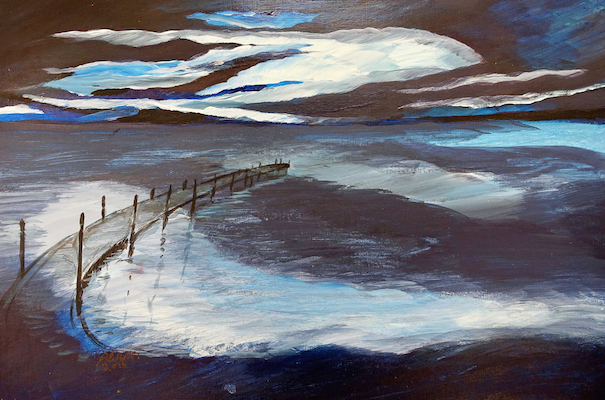Khalid Qassim and Ahmed Rabbani will starve as I remember waking up under an archway of tall pine. The smell of coffee. The up and down of steep roads. NPR playing softly, it seemed, from somewhere outside the car. We were in the Appalachian Mountains. The dark was vaguely green and here and there a star shone through the trees. I had just gotten out of juvie, and my new guardians were taking me on a road trip from Michigan to Long Island to meet the guardian’s extended family, which was now also mine.
The guardian’s father lived in a cul-de-sac of small mansions. I’d never been somewhere like West Islip. A Porsche followed by a BMW followed by a Jaguar stood in line behind a single stop light. I saw more flowers in one front yard than I’d ever seen in my entire life.
On the second day, the guardian’s whole family came over and had a barbecue with lobster and filet mignon to celebrate our arrival. The wooden porch was the shape of a hexagon, tiered twice by steps, and backed by a trellis covered in vines. Beside it was a dusty, iridescent, clamshell driveway that looked like it led to the moon. A warm, steady breeze carried the faint umami smell of seaweed and salt from the ocean nearby. It was early evening. Late June. A thousand fireflies bobbed.
I was so happy I threw a pie in my new cousin’s face. We laughed like we’d known each other a long time. We chased each other in circles around the yard.
It wasn’t long before the guardian took me aside, got down on her knees, and looked deep into my eyes. She leaned very close to me and asked if I was having sexual thoughts about my new cousin. She asked me if I wanted to hurt him. Her breath smelled faintly metallic, like blood. I realized how the whole thing looked to her. I blamed another cousin. I elaborated with exponentially increasing, fanatic zeal, and everybody looked at me like the guardian had made a mistake.
Suddenly, nothing impressed me. The flowers seemed to droop, the fancy cars lost their luster, and I remembered I was black, 14, and fresh out of a cage.
In juvie, in the children’s home before that, in every memory I had ever had of the world, the sum of my actions was clear, graded, measured against the rules, regulations, and repetitions of daily life. Out here, in the outside world, everyone just fell silent and turned away. I’d never known punishment like that. I was shocked by its force. I went out and sat on the porch, bemused, when the cousin I’d blamed for the pie came out and joined me.
“Have you been to the water?” she asked.
“No,” I muttered. “I guess not.”
“It’s just over there,” she said, pointing.
Where the sky should have been hung a dark weft of oil and future storms. It was Muhammad Ansi’s painting of the sea. It was the dark pier of a human heart stretching out across the water towards a darker, simpler doom.
When I looked up from the empty wine glasses on the abandoned patio, it was a terribly beautiful day. The new cousin pointed to a pale dirt path, barely visible among the low, green bushes, dappled with tiny, yellow flowers.
For a moment, I let myself remember the boys in my program. The gentle ones who loved their anger. The innocent ones who sprinted towards doom. High-acuity, at-risk youth, they called us. Devoid of empathy, they said. I imagined us walking up the path towards the water.
We marched everywhere in a perfect line, equidistant from each other, with arms folded across our chests. We lined up like soldiers and marched over the stretch of faded blue linoleum that ran the length of our program’s wing; over the hypotenuse of pavement and grass between our building and the school, day after day, at exactly 7:30 each morning.
I don’t remember when I forgot what the outside world was like; all I knew was it was waiting for me. I could feel it like a tide felt the pull of the moon. A place where thought and feeling, logic and emotion, function and form were built closer.
Years later, I was asked to co-curate Ode to the Sea: Art from Guantanamo. At first, I was unmoved by the images. I stared at them coldly. Boats. Tonalism. Countless images of the sea. It wasn’t until I found myself giving the work who I was, where I came from, and how I got there that I felt somehow depicted by it.
Every image is stamped with an Approved By U.S. Forces sign. Sometimes, the stamp bleeds through from the reverse side, like a secret the image can’t keep.
When people ask me what I want from this exhibition, I don’t say I want to return the living from the dead. I walk towards a pale dirt path, barely visible among the low, green bushes, dappled with tiny, yellow flowers. The new cousin walks behind me. It is dusk. The sky is a pink and purple gradient pocked with faint stars. The path leads to a clearing and a little wooden dock. A boat bumps gently against it. We walk to the edge of the dock, take off our shoes and sit, looking out at the bay. The dark, flat waters look empty, undisturbed.
“Are there sharks?” I ask. “Octopus?”
“Of course,” says the new cousin. “But not here.”
I don’t say I’ve never been in the ocean. I don’t need to. Instead, she takes my hand, as I lower in one foot then the other.
Header image: Pier, 2016, Muhammad Ansi, Paper, pigment, 12 x 18 in


